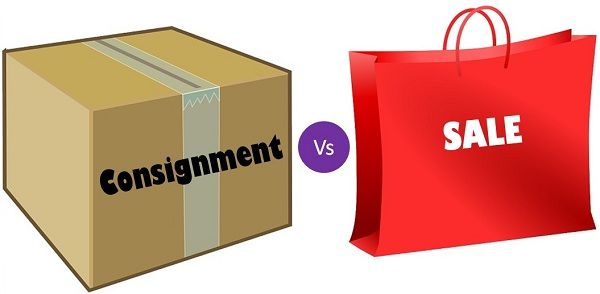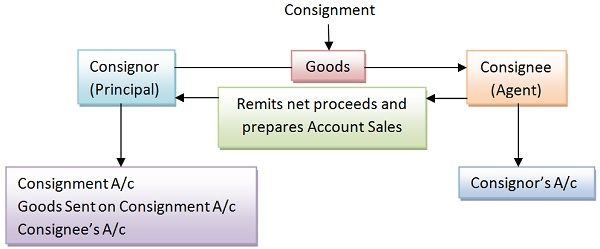 Consignment refers to a commercial arrangement in which goods are delivered to the agent by the seller, for the purpose of sale to the customers, on behalf of the seller. The term consignment is commonly juxtaposed with Sale. Typically, Sale is a transaction between two parties in which the ownership, title and possession goods are transferred from seller to buyer for the money consideration.
Consignment refers to a commercial arrangement in which goods are delivered to the agent by the seller, for the purpose of sale to the customers, on behalf of the seller. The term consignment is commonly juxtaposed with Sale. Typically, Sale is a transaction between two parties in which the ownership, title and possession goods are transferred from seller to buyer for the money consideration.
The scope of sale is wider in comparison to a consignment, as consignment is also a type of sale. The main difference between these two trading arrangements is that in the case of consignment the parties follow the relationship of principal and agent, whereas, in the case of the sale, the parties follow the relationship of debtor and creditor.
Whenever one is engaged in any type of sale transaction, he/she should have full knowledge of the differences between consignment and sale. In this article excerpt, we have explained the two, take a read.
Content: Consignment Vs Sale
Comparison Chart
| Basis for Comparison | Consignment | Sale |
|---|---|---|
| Meaning | When the goods are delivered to the agent by the owner for selling purposes, is known as Consignment. | A transaction in which goods are exchanged for a price is known as a sale. |
| Parties | Consignor and Consignee | Seller and Buyer |
| Relationship between parties | Principal and Agent | Creditor and Debtor |
| Possession and Ownership | Possession is transferred, but ownership is not transferred, until they are sold to the final consumer. | Both are transferred with the transfer of goods. |
| Returning back of goods | The consignee can return the unsold stock to the consignor. | The buyer cannot return the goods to the seller until and unless the seller agrees to the same. |
| Risk of loss | Borne by consignor | Borne by buyer |
| Expenses incurred | Met by consignor | Met by buyer |
| Consideration | Commission to the agent. | Profit to the seller. |
Definition of Consignment
The word consignment is derived from the word ‘consign’ which means ‘to send’. Consignment is a deal between consignor and consignee, whereby the consignor plays the role of principal and the consignee is the agent. Consignor delivers the goods to the consignee for the purpose of selling it to the ultimate consumer on behalf of the principal. Goods are dispatched to the consignee at cost or invoice.
A portion of sales made by the consignor is given to the consignee in the form of consideration for the services provided by the agent which is known as the Commission. There are three types of commission:
- Ordinary Commission
- Del-credere Commission
- Overriding Commission
The expenses, damages, spoilage, normal and abnormal losses are borne by the consignor because in a consignment sale only the possession of goods is transferred to the consignee whereas the title of goods lies with the consignor. However, if the agent sells the goods to the consumer, then the risk and rewards are transferred with the transfer of goods. He sends a statement to the principal known as Account Sales. Account Sales contain all the details of goods sold, stock in hand, normal loss, abnormal loss, commission, etc.
Definition of Sale
A transaction between two parties in which the exchange of goods for price takes place is known as Sale. It is a contract in which a proposal is made by one party to buy or sell goods or property for monetary value, and the other party accepts the proposal. Hence all the essentials of a valid contract like the capacity of parties, free consent, lawful object, agreement, lawful consideration, etc. should be there.
A sale is a bargain deal between the parties in which the risk and rewards are transferred from the seller to the buyer with the transfer of goods. The following are the essential features of Sale:
- Minimum two parties must be there.
- The objective of the contract is to exchange goods for a mutual benefit called price.
- Only movable property comes under the category of goods which includes goods existing at the time of the contract as well as future goods.
- The consideration paid or promised should be money only.
- Sale includes an agreement to sell.
- Transfer of goods must be there.
Key Differences Between Consignment and Sale
The following are the major differences between consignment and sale:
- When goods are forwarded by the owner to his agent conclude the sale, it is known as Consignment. A Sale is a transaction between two parties whereby goods are traded for a mutual benefit i.e. price.
- The parties to a consignment are consignor and consignee whereas the parties to the sale are buyer and seller.
- The relationship amidst parties of consignment are of principal and agent, but if we talk about the sale, they are debtor and creditor.
- In consignment, only the possession of goods transfers not the ownership. On the other hand, in the sale, both the ownership and possession are transferred to the buyer.
- The consignee can return the unsold goods to the consignor in case of consignment while, in the sale, the buyer has to take permission of the seller for returning the goods.
- In consignment, all the risks and rewards rest with the consignor. Conversely, in the sale, the risks and rewards are transferred to the buyer by the seller.
- The consignee gets remuneration for his services in the form of commission based on sales made by him. In contrast to sale, whereby the seller earns profit from the sales made.
Conclusion
There are many forms of sale and consignment is one of the forms of sale. In the United States of America, Consignment shops are the Second-Hand Shops where the agent sells used goods on behalf of the owners to the customers. The goods are sold at a price which is less than their original price. A portion of the sale proceeds is handed to the agents for their services. However, all the second-hand shops are not consignment shops.







johnmijo says
Good website. keep it up.. I hope this is useful for students.. I m very happy as I got answers of my assignment questions. Thank you.
Avanish says
Described in very easy language.
howard cohen says
is it ok to pay for mdse received on a memo that has not been invoiced yet?
please respond directly to my email…thanks!
Debtor Finance says
Thanks for sharing this article. I think that this will surely help me to know the difference between Consignment and Sale. I think that this will surely help me manage my business.
FactorLoads says
Thanks for sharing the difference between consignment and sale. This article is very informative for me. I now definitely understand it well. I will share this to my business owner friends as well.
Taylor Hicken says
You made a good point when you shared that consignment is one of the forms of sale which includes used items.
Joan says
Thank you so much for the differences between a consignment and a sale